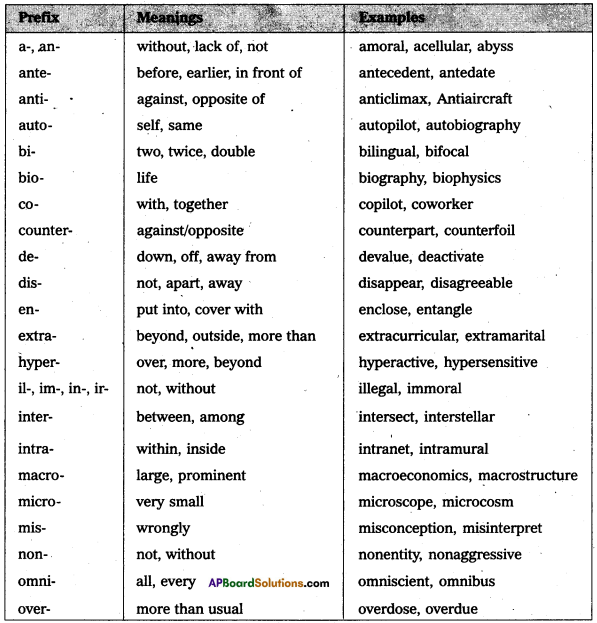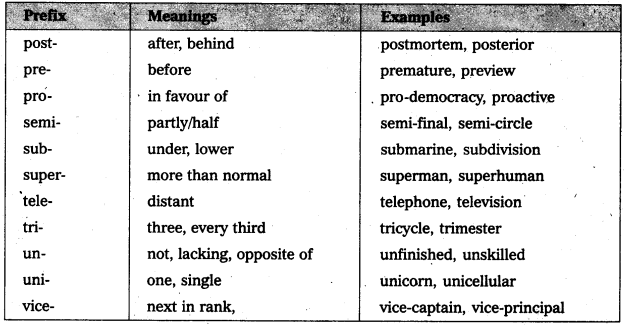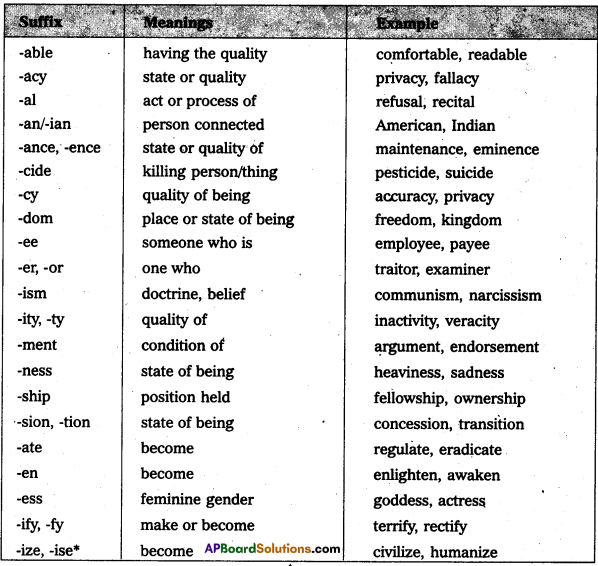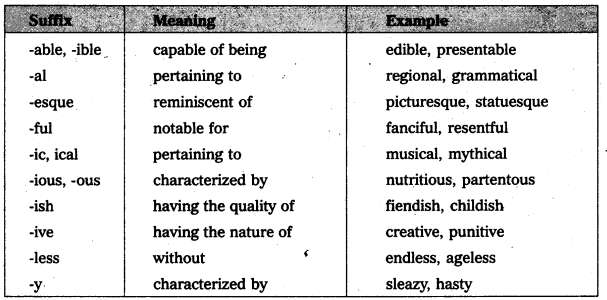Andhra Pradesh BIEAP AP Inter 1st Year English Study Material Prose 1st Lesson Abraham Lincoln’s Letter to His Son’s Teacher Textbook Questions and Answers, Summary.
AP Inter 1st Year English Study Material 1st Lesson Abraham Lincoln’s Letter to His Son’s Teacher
Questions & Answers
Question 1.
How is the teacher expected to inculcate honesty and worldly wisdom in the child ?
Answer:
Abraham Lincoln wrote a letter to the teacher of his son. Hiš letter is filled with a number of suggestions to the teacher. The teacher should prepare the boy to tackle wars, tragedy and sorrow. He should have faith, love and courage in life. A friend should be seen in an enemy. Victory and failures are natural1 in this world. His behaviour with others should be gentle. Cynicism should not be encouraged2. The boy must have faith in himself. He should not blindly follow the crowd. Thus honesty3 and worldly wisdom4 could be seen in a child.
1. సహజము
2. ప్రోత్సహించుట
3. నిజాయితీ
4. తెలివి.
అబ్రహాంలింకన్ తన కుమారుని ఉపాధ్యాయునికి ఒక ఉత్తరం వ్రాశారు. ఆ ఉత్తరంలో ఉపాధ్యాయునికి ఎన్నో సలహాలున్నవి. ఉపాధ్యాయుడు, ఆ అబ్బాయిని యుద్ధాలు, విచారగ్రస్త సంఘటనలు, బాధలు ఎదుర్కొనగలుగునట్లు చేయాలి. అతనికి జీవితంలో నమ్మకము, ప్రేమ మరియు మనో నిబ్బరము ఉండాలి. ఒక శత్రువులో మిత్రుణ్ణి చూడగలగాలి. ఈ ప్రపంచంలో జయాలు, అపజయాలు సహజము. అతని ప్రవర్తన ఇతరుల పట్ల సౌమ్యంగా ఉండాలి. ఇతరుల అభివృద్ధి చూచి ఓర్వలేనితనాన్ని ప్రోత్సహించరాదు. అతడు తన మీద తనకు నమ్మకం కలిగి ఉండాలి. జనాన్ని గ్రుడ్డిగా వెంబడించరాదు. నిజాయితీ మరియు ప్రపంచ జ్ఞానము, ఒక బిడ్డలో కనిపించాలి.
Question 2.
How can the teacher instil faith, love and courage in Lincoln’s son?
Answer:
Abraham Lincoln wrote a letter to the teacher of his son. His letter is filled with a number of suggestions to the teacher. The teacher should be careful in his dealing with the boy. The boy should be adventurous1. He should know that a friend should be seen in an enemy. His behaviour with others should be gentle2. Cynicism should not be encouraged. He must be adventurous to tackle wars, tragedy and sorrow. Faith in himself leads to faith in mankind3. Thus faith, love and courage could be instiled4 in Lincoln’s son.
1. ధైర్యము కలిగిన వాడు
2. సున్నితంగా
3. మానవజాతి
4. పాదుకొల్పుట, కలుగజేయుట
అబ్రహాంలింకన్ తన కుమారుని ఉపాధ్యాయునికి ఒక ఉత్తరం వ్రాశారు. ఆ ఉత్తరంలో ఉపాధ్యాయునికి ఎన్నో సలహాలున్నవి. ఉపాధ్యాయుడు, ఆ బాలుని పట్ల బహుజాగ్రత్తగా వ్యవహరించాలి. ఆ అబ్బాయి ధైర్యశాలి అయియుండాలి. ఒక శత్రువులో ఒక మిత్రుణ్ణి చూడగలిగి యుండాలి. ఇతరులతో అతని ప్రవర్తన సౌమ్యంగా ఉండాలి. ఇతరుల అభివృద్ధిని ఓర్చలేని లక్షణాన్ని ప్రోత్సహించరాదు.
యుద్ధాలు, బాధలు, విఛారాలను ధైర్యంగా ఎదుర్కొవాలి. తన మీద తనకు నమ్మకముంటే అది మానవజాతి మీద నమ్మకం కలిగిస్తుంది. ఈ విధంగా విశ్వాసము, ప్రేమ మరియు ధైర్యము అను వానిని లింకన్ గారి కుమారునిలో నింపాలి.
![]()
Question 3.
What should the teacher do to help the child tackle good and evil in the world?
Answer:
Abraham Lincoln wrote a letter to the teacher of his son. His letter is filled with a number of suggestions to the teacher. The teacher should prepare the boy to tackle wars, tragedy and sorrow. The world is filled with many things both good and bad. There are enemies but the boy should find a friend in an enemy. There is no shame? in failures. There is mystery in the creation of this world. The boy should not blindly follow the crowd. He should understand good and evil of the things and follow the path of truth. He should have courage to tackle challenges in life. Thus the teacher’s role is important.
1. అవమానము
2. విచిత్రములు
3. మార్గము
అబ్రహాంలింకన్ తన కుమారుని ఉపాధ్యాయునికి ఒక ఉత్తరం వ్రాశారు. ఆ ఉత్తరంలో ఉపాధ్యాయునికి ఎన్నో సలహాలున్నాయి. ఆ అబ్బాయిని, ఆ ఉపాధ్యాయుడు, యుద్ధాలు, విచారగ్రస్తమైన విషయములు మరియు విచారము అనే వాటిని ఎదిరించే విధంగా సిద్ధపరచాలి. ఈ ప్రపంచం చాలా మంచివి మరియు చెడ్డవైన వాటితో నిండియున్నది. శత్రువులున్నారు.
కానీ ఆ అబ్బాయి శత్రువులో మిత్రుణ్ణి చూడాలి. వైఫల్యాల వలన అవమానము లేదు. ప్రపంచంలో సృష్టిలో విచిత్రమైన అంశాలున్నాయి. ఆ అబ్బాయి గ్రుడ్డిగా, జనాన్ని నమ్మి వెంబడించరాదు. మంచి మరియు చెడులను గురించి తెలిసి, సత్యమార్గంలో నడవాలి. జీవితములోని సవాళ్ళను ఎదుర్కొనాలి. ఈ విధంగా ఉపాధ్యాయుని పాత్ర చాలా ప్రాధాన్యత గలది.
Annotations
Question 1.
“It is all going to be strange and new to him for a while and I wish you would treat him gently”.
Answer:
Context : This passage is taken from the lesson “Abraham Lincoln’s Letter to his Son’s Teacher”, written by Abraham Lincoln, the noted 16th President of the U.S.A. It is about his appeal1 to a teacher in instructing2 a boy of tender age.
Explanation : In the beginning of the letter, the author introduces3 the boy to the teacher. He tells that his son is innocent4 and is going to join the school. The school routine5 is new to him and thus he is afraid of the new atmosphere. He is happy at home with the parents but he has to accustom6 to the new life. So, he advises the teacher to treat the boy gently and affectionately7. The boy can adjust to the environment8 slowly. Lincoln expresses his views about child psychology.
General Relevance : It is natural for a child to show aversion9 to go to school. If there is no encouragement at school, the child shall be spoiled10. So Lincoln gives an interesting appeal to the teachers in general.
1. విన్నపము
2. పాఠము నేర్పుట
3. పరిచయము చేయుట
4. అమాయకమైన
5. క్రమమైన పద్ధతి
6. అలవాటు పడుట
7. ప్రియంగా
8. పరిసరములు
9. అయిష్టము
10. చెడిపోవును
సందర్భము : “Abraham Lincoln’s Letter to His Son’s Teacher” అనే పాఠము నుండి ఈ వాక్య భాగము తీసుకొనబడినది. దీనిని USA కు 16వ రాష్ట్రపతియైన అబ్రహాంలింకన్ వ్రాశారు. చిన్న వయస్సులో నున్న బాలునికి ఎలా చదువు చెప్పాలి అనే విషయమై ఆయన చేసిన విజ్ఞాపన.
వివరణ : ఈ ఉత్తరము ప్రారంభంలో, రచయిత తన కుమారుణ్ణి, ఉపాధ్యాయునికి పరిచయం చేస్తున్నాడు. తన కుమారుడు అమాయకుడని, స్కూలులో చేరబోతున్నాడని ఆయన చెప్పారు. పాఠశాల వాతావరణము అతనికి క్రొత్త గనుక అతడు క్రొత్త వాతావరణాన్ని బట్టి భయపడుతున్నాడు. ఇంటి దగ్గర తన తల్లిదండ్రులతో హాయిగా ఉన్నాడు కానీ క్రొత్త జీవితానికి అతడు అలవాటు పడాలి. అందుచేత ఆ అబ్బాయిని ప్రేమతో, సౌమ్యంగా చూడాలని ఉపాధ్యాయునికి సలహాయిస్తున్నాడు. పరిసరాలకు నెమ్మదిగా అలవాటుపడతాడు. లింకన్ తనకు గల చిన్న పిల్లల మనస్తత్వాన్ని ఈ మాటలలో ప్రకటించారు.
సాధారణ భావన : సాధారణంగా ఒక చిన్న పిల్లవాడు పాఠశాలకు వెళ్లడానికి అయిష్టత చూపుతాడు. స్కూలులో తగిన ప్రోత్సాహం లేకపోతే, పిల్లవాడు చెడిపోతాడు. అందుచేత లింకన్ గారు ఉపాధ్యాయులందరినీ ఉద్దేశించి మంచి, విన్నపం చేశారు.
Question 2.
“Teach him to learn how to gracefully lose and enjoy Winning when he does win”.
Answer:
Context : These lines are taken from the lessson “Abraham Lincoln’s Letter to his Son’s Teacher’, written by Abraham Lincoln, the noted 16th President of the U.S.A. It is about his appeal to the teacher, in instructing a boy of tender age.
Explanation : The author advises the teacher to be careful1 in his dealing with the boy. The boy should have development in all spheres of life. He should tackle wars, tragedy and sorrow. Victory2 and failures are natural in this world. The boy must have self confidence. He should not be disheartened when he loses. When he wins, he should feel joy and satisfaction3. This will make him honest and self reliant.
General Relevance : In this world, life is a blend of both success and failure. One should take the both equally. It is natural for one to get both these experiences. He should show right response to the occasion.
1. జాగ్రత్తగా వున్న
2. జయము, గెలుపు
3. తృప్తి
సందర్భము : “Abraham Lincoln’s Letter to his Son’s Teacher” అనే పాఠము నుండి ఈ వాక్య భాగము తీసుకొనబడినది. దీనిని USA కు 16వ రాష్ట్రపతియైన అబ్రహాంలింకన్ వ్రాశారు. చిన్న వయస్సులో నున్న బాలునికి ఎలా చదువు చెప్పాలి అనే విషయమై ఆయన చేసిన విజ్ఞాపన.
వివరణ : రచయిత, ఆ బాలుని విషయంలో జాగ్రత్తగా ఉండాలని ఉపాధ్యాయునికి సలహా ఇచ్చాడు. ఆ అబ్బాయి అన్ని రంగాలలో అభివృద్ధిని కలిగియుండాలి. అతడు యుద్ధాన్ని, బాధలను, విచారాన్ని ఎదిరించాలి. ఈ ప్రపంచంలో విజయాలు మరియు అపజయాలు సహజముగా ఉంటాయి. ఆ అబ్బాయికి ఆత్మనిర్భరత ఉండాలి. ఓడినప్పుడు అతడు గుండె ధైర్యం చెడరాదు. గెలిచినప్పుడు సంతోషము మరియు సంతృప్తి కలిగియుండాలి. ఇది అతనిని నిజాయితీపరునిగా మరియు స్వయం సమృద్ధం అయ్యే విధంగా చేస్తుంది.
సాధారణ భావన: ఈ ప్రపంచంలో జీవితం, జయాపజయాలు కలిగియుంటుంది. ఆ రెంటిని సమానంగా తీసికొనాలి. ఈ రెండు అనుభవాలు ఒక మనిషికి సహజము. సందర్భానికి తగినట్లు సరియైన ప్రతిస్పందన చూపాలి.
![]()
Question 3.
“There can be glory in failure and despair in success”.
Answer:
Context : These lines are taken from the lesson “Abraham Lincoln’s Letter to His Son’s Teacher”, written by Abraham Lincoln, the noted 16th President of the U.S.A. It is about his appeal to the teacher in instructing a boy of tender age.
Explanation : The author advises the teacher to be careful in his dealing with the boy. The boy should have development1 in all spheres of life. There are many ups and downs in life. Victory and failures are natural in this world. The teacher should prepare the boy to tackle the situation. The boy should know that a failure is always glorious2 and success sometimes may lead to despair3 also. So he should be ready to be practical4 in his life.
General Relevance : The letter is a general appeal to the teachers. The boy should be ready to bear5 the difficulties and expect a success in course of time. Similarly6 he should know that a success may also lead to despair, after wards.
1. అభివృద్ధి
2. ఘనమైన
3. నిరాశ
4. ఆచరణ పూర్వకంగా
5. సహించుట
6. అదేవిధంగా
సందర్భము : “Abraham Lincoln’s Letter to his Son’s Teacher” అనే పాఠము నుండి ఈ వాక్య భాగము తీసుకొనబడినది. దీనిని USA కు 16వ రాష్ట్రపతియైన అబ్రహాంలింకన్ వ్రాశారు. చిన్న వయస్సులో నున్న బాలునికి ఎలా చదువు చెప్పాలి అనే విషయమై ఆయన చేసిన విజ్ఞాపన.
వివరణ : ఆ బాలుని విషయములో జాగ్రత్తగా వ్యవహరించాలని ఉపాధ్యాయునికి సలహా ఇస్తున్నారు, రచయిత. బాలుడు అన్ని రంగాలలో అభివృద్ధి చెందాలి. జీవితంలో అనేక ఎగుడు దిగుడులుంటాయి. జయము మరియు అపజయము అనునవి సహజము. ఉపాధ్యాయుడు ఆ అబ్బాయి ఈ పరిస్థితిని తట్టుకొనే విధంగా తయారు చేయాలి. ఓటమి అనేది ఎల్లప్పుడు ఘనమైనది అని ఆ అబ్బాయి గ్రహించాలి మరియు జయము అనేది కొన్ని సార్లు నిరాశ కూడా దారితీయవచ్చు. అందుచేత అతడు తన జీవితంలో అన్ని విషయములలో ఆచరణపూర్వకంగా ఉండాలి.
సాధారణ భావన : ఈ ఉత్తరం సాధారణంగా అందరు ఉపాధ్యాయులకు సంబంధించినది. బాలురు కష్టాలను ఓర్చుకొనడానికి సిద్ధంగానుండి, కాలక్రమంలో విజయాన్ని సాధించాలి. అదేవిధంగా కొన్నిసార్లు నిరాశలోనికి కూడా పోవచ్చును అని తెలిసికొనాలి.
Question 4.
“Teach him to have faith in his own ideas, even if everyone tells him they are wrong”.
Answer:
Context : This passage is taken from the lesson “Abraham Lincoln’s Letter to His Son’s Teacher” written by Abraham Lincoln, the noted 16th President of the U.S.A. It is about his appeal to the teacher, in instructing a boy of tender age.
Explanation : The author advises the teacher to be careful in his dealing with the boy. The boy must become an individual having complete knowledge of the world. He should know the mystery’ in the creation of birds, bees and flowers. He should be a dependent upon himself. He should not blindly follow the crowds. After listening to everybody, he should conclude himself to do whatever he wants to do. Thus he should become an individual with virtue.
General Relevance : It is general for one to consider the opinion of the crowds, but a teacher, according to the author, should guide the boy in the right direction to decide the way for himself. A boy should become resolutet in his decisions.
1. విచిత్రము
2. పూర్తిచేయుట
3. సుగుణము
4. మార్పులేని నిర్ణయము కలిగియుండుట, నిబ్బరముగానుండట
సందర్భము : “Abraham Lincoln’s Letter to his Son’s Teacher” అనే పాఠము నుండి ఈ వాక్య భాగము తీసుకొనబడినది. దీనిని USA కు 16వ రాష్ట్రపతియైన అబ్రహాంలింకన్ వ్రాశారు. చిన్న వయస్సులో నున్న బాలునికి ఎలా చదువు చెప్పాలి అనే విషయమై ఆయన చేసిన విజ్ఞాపన.
వివరణ : రచయిత, ఆ బాలునితో జాగ్రత్తగా వ్యవహరించవలెనని ఉపాధ్యాయునికి సలహా ఇస్తున్నాడు బాలుడు ఈ ప్రపంచంలో జ్ఞానము కలిగినవాడుగా సిద్ధం కావాలని చెప్పారు. పక్షులు, తేనెటీగలు మరియు పూల మొక్క సృష్టి చాలా విచిత్రము అని అతడు తెలిసికొనాలి. అతడు తన మీదనే తాను ఆధారపడియుండాలి. అతడు సమాజాన్ని గ్రుడ్డిగా అనుసరించరాదు. ప్రతివారు చెబుతున్నది విని, అతడు తాననుకొన్నది తను చేసే పద్ధతిలో ఉండాలి. ఈ విధంగా అతడు మంచి గుణములు కలిగినవాడు కావాలి.
సాధారణ భావన : సహజంగా జనం యొక్క ఉద్దేశాన్ని పరిశీలించడం అనేది సహజమైన విషయము. కానీ రచయిత ఉద్దేశం ప్రకారం, బాలుణ్ణి సరియైన మార్గంలో నడిపించాలి. అతడు తన మార్గంతానే నిర్ణయించుకొనగలిగేలా చేయాలి. ఒక అబ్బాయి తన నిర్ణయముల విషయములో నిబ్బరంగా ఉండాలి.
Comprehension
I. Read the following passage and answer the questions given below.
Bapuji is in prison, but the magic of his message has stolen the hearts of Indians in millions. Men and Women, and even little children, come out of their little shells and become India’s soldiers of freedom. You and I are fortunate to see this happening before our eyes and to take some part ourselves in this great drama. What part shall we play in it ? If we are to be Indian’s soldiers we have to respect India’s honour, and that honour is a sacred trust. It is no easy matter to decide what is right and what is not. One little test I shall ask you to apply whenever you are in doubt. Never do anything in secret or anything that you wish to hide. For the desire to hide anything means that you are afraid and fear is a bad thing and unworthy of yours. Be brave and all the rest follows.
Questions and Answers :
Question 1.
What has stolen the hearts of India’s millions ?
Answer:
Bapuji’s magic message has stolen the hearts of Indians in millions.
Question 2.
Who have become the India’s soldiers of freedom ?
Answer:
Men, women and little children became soldiers of freedom.
Question 3.
Identify the word in the passage that means ‘lucky’.
Answer:
Fortunate.
Question 4.
What is India’s sacred trust ?
Answer:
India’s honour.
![]()
Question 5.
Why should one not do things in secret ?
Answer:
Doing things in secret means that, we are afraid of doing. Fear is a bad thing.
II. Read the following passage and answer the questions given below.
The capitalist system of society does not foster healthy relations among human beings. A few people own all the means of production and others-though nominally few have to sell their labour under conditions imposed upon them. The emphasis of capitalism being on the supreme importance of material wealth the intensity of its appeal is to the acquisitive intensity. It promotes worship of economic power with little regard to the means employed for its acquisition and the end that it serves. By its exploitation of human beings to the limits of endurance its concentration is on the largest profit rather than maximum production. Thus the division of human family is done on the basis of economic circumstance. All this is injurious to division of human dignity. And when the harrowed poor turn to the founders of religion for succor, they rather offer a subtle defense for the established order. They promise future happiness for their present suffering and conjure up visions of paradise to redress the balance to soothe the suffering and the revolt of the tortured men. The system imposes injustice, the religion justifies it.
Questions and Answers :
Question 1.
Does the capital system maintain healthy relations ?
Answer:
No, it does not maintain healthy relations.
Question 2.
Which promotes the worship of economic power ?
Answer:
The emphasis of capitalism.
Question 3.
On what basis is the division of human family done ?
Answer:
On the basis of economic circumstance.
Question 4.
What is the antonym for ‘impose’ ?
Answer:
Remit.
Question 5.
What justifies the injustice imposed by the system ?
Answer:
Religions.
Vocabulary
Task 1 : Identify and correct the SIX mis-spelt words from each of the passages given below:
A. Teach him to be gentil with people, tough with tuff people. Steer him away from envvy if you can and teach him the secrate of quite lafter.
Answer:
gentil – gentle, envy – envy, tuff – tough, away – a way, secrate – secret, lafter – laughter
B. Teach him to cell his tallents and brains to the highest bider but never to put a price tag on his hart and soul. Let him have the corage to be impashent.
Answer:
cell – sell, tallents – talent, bider – bidder, hart – heart, corage – courage, impashment – imatient
C. In school, teach him it is far more honourabul to fail than to cheet. Teach him to learn how to grasefully loose, and enjoy wining when he does win.
Answer:
honourabul – honourable, cheet – cheat, learne – learn, grasefully – gracefully, loose – lose, wining – winning
Task 2: Word formation
Prefixes and suffixes together are called affixes. They serve as wonderful tools to form words in English. Both the prefixes and suffixes are formed with a letter or a group of letters. A prefix is added at the beginning of the root whereas a suffix, at the end of it.
e.g. a + thiest and be + little (‘a’ and ‘be’ are prefixes)
catch + y and calm + ly (y’ and ‘ly’ are suffixes)
Prefixes and suffixes help form new words from roots. They also change the grammatical function of the word.
e.g.
‘calm’ = adjective
‘calmly’ = adverb
‘little’ = an adjective
belittle’ = a verb.
Thus the knowledge of prefixes and suffixes will enhance our word power. Here is a compact table of commonly used prefixes and suffixes together with examples.
Common Prefixes


Common Suffixes


![]()
Task 1 : Fill in the blanks using an appropriate prefix/suffix to the root provided
Question 1.
One who does not follow morality is _____ (moral)
Answer:
Immoral
Question 2.
Please ____ (mind) me of posting the letter.
Answer:
remind
Question 3.
The second pilot in the airplane is called ___ (pilot)
Answer:
co-pilot
Question 4.
Where ____ (ignore) is a bliss, it is folly to be wise.
Answer:
ignorance
Question 5.
A cheque with a prior date _____. (dated)
Answer:
predated
Question 6.
A class between 10th and Degree is called ____. (mediate)
Answer:
Intermediate
Question 7.
People living on border between two states are usually ____. (lingual)
Answer:
bilingual
Question 8.
One should not be ____ (sensible) to the things happening around.
Answer:
insensible
Question 9.
The prince need not be a ____ (grammar) according to Aurangzeb.
Answer:
grammarian
Question 10.
The ___ (god) ____ (appear) when he opened eyes.
Answer:
disappeared
Abraham Lincoln’s Letter to His Son’s Teacher Summary in English
Abraham Lincoln wrote a letter to the teacher of his son. He was the President of the United States who created a history in the politics of America. His letter is filled with a number of suggestions1 to the teacher. He advises the teacher to try for the development of the boy in all spheres2. The boy should become adventurous3. He should learn the virtue4 of humanity5.
The teacher should prepare the boy to tackle6 wars, tragedy and sorrow. He should have faith, love and courage7 in life. He should know that a friend should be seen in an enemy. Victory and failures are natural in this world. His behaviour with others should be gentle. Cynicism8 should be encouraged.
The boy must have faith in himself. Birds, bees and flowers show the greatness of creation9. Á boy should not blindly follow the crowd. He should listen to all but should take the things only after careful understanding. He should show courage in impatience10 and patience in bravery11. When a boy learns how to have faith in himself and in his activity then only, he will be led to have faith in mankind.
Finally Lincoln expresses his affection towards his son. He advised the teacher to do his best in building up the boy’s character. The letter shows his passionate12 zeal for universal13 appeal.
1. సలహాలు
2. రంగములు
3. సాహసము గల
4. మంచి లక్షణము
5. మానవత్వము
6. ఎదుర్కొనుట
7. ధైర్యము, గుండెనిబ్బరము
8. ఇతరుల అభివృద్ధిని చూచి ఓర్చలేనితనము.
9. సృష్టి
10. అసహనము
11. ధైర్యము
12. బలీయమైన
13. సర్వజనీనమైన.
Abraham Lincoln’s Letter to His Son’s Teacher Summary in Telugu
అబ్రహాంలింకన్, తన కుమారుని ఉపాధ్యాయునికి ఒక ఉత్తరం వ్రాస్తున్నాడు. ఆయన అమెరికా రాజకీయ చరిత్రలో ప్రత్యేకత సృష్టించిన దేశ అధ్యక్షుడు. ఆ ఉత్తరంలో, ఉపాధ్యాయునికి అనేక సలహాలు ఉన్నవి. ఆయన, ఆ ఉపాధ్యాయుణ్ణి, తన కుమారున్ని అన్ని రంగాలలో అభివృద్ధి చెందినవాడుగా, సిద్ధపరచుమని సలహా ఇస్తున్నాడు. ఆ బాలుడు సాహసకార్యములు చేయగలవాడు కావాలి. అతడు మానవత్వము అనే మంచి లక్షణాన్ని నేర్చుకోవాలి.
యుద్ధాన్ని కష్టతరమైన అంశాల్ని, విచారాన్ని ఎదుర్కోవాలి. అతడు విశ్వాసము, ప్రేమ మరియు ధైర్యము కలిగి యుండాలి. ఒక శత్రువులో ఒక మిత్రుణ్ణి చూడగలగాలి. ఈ ప్రపంచంలో విజయం మరియు అపజయము అనేవి సర్వసమాన్యము. అతడు ఇతరులతో మంచి ప్రవర్తన కలిగియుండాలి. ఇతరుల పట్ల నమ్మకం లేని గుణాన్ని ప్రోత్సహించరాదు.
ఆ అబ్బాయి తన పట్ల తాను నమ్మకము కలిగియుండాలి. పక్షులు, తేనెటీగలు, పూలు అనునవి సృష్టిలోని గొప్పతనాన్ని చూపిస్తాయి. ఆ అబ్బాయి గ్రుడ్డిగా అందర్నీ అనుసరించరాదు. అతడు అందరూ చెప్పినది వినాలి కానీ జాగ్రత్తగా అవగాహన చేసుకొని, పనులను చేయాలి. అతనికి అసహనంలో గుండెనిబ్బరము, సహనంలో ధైర్యము ఉండాలి. ఒక అబ్బాయి తన పట్ల తనకు నమ్మిక యుంటేనే, మానవ జాతి పట్ల నమ్మకం కలుగుతుంది.
చివరిగా లింకన్ గారు తన కుమారుని పట్ల ప్రేమను తెలియజేస్తున్నాడు. ఆ బాలుని ప్రవర్తనను కట్టడానికి, ఆ ఉపాధ్యాయుడు తన శక్తి కొలది ప్రవర్తించాలని, సలహానిచ్చాడు. ఈ ఉత్తరము ద్వారా, రచయిత యొక్క సార్వజనీన పిలుపు పట్ల గల అత్యంత కాంక్షను తెలుపుచున్నారు.
Abraham Lincoln’s Letter to His Son’s Teacher Glossary
Textual Glossary
1. adventure (n) : /
![]() /
/
: an unusual, exciting or dangerous activity; సాహసకృత్యం.
e.g. Trekking in the Alphs is a great adventure.
2. scoundrel (n) : /ska\(U\)n.drəl/
: a person, especially a man, who treats others badly and has no moral principles; దుష్టుడు, పోకిరి.
e.g. He is a lying scoundrel; క్రూరుడైన.
3. crooked (adj.) : /kr\(U\)k.ıd/ :
dishonest ; నీతిలేని అక్రమైన
e.g. The character of Satan is both cunning and crooked.
4. dedicated (adj.) : /ded.ıkeı.tid/
: believing that something is very important and giving a lot of time and energy to it; సమర్పించు, అర్పణచేయడం.
e.g. Ambedkar is dedicated to the cause of the oppressed.
5. cents: (n): a unit of money worth 0.01 of the US dollar; నాలుగు దమ్మిడిల వెలగల అమెరికా దేశపు నాణెము.
e.g. One hundred cents make a dollar.
![]()
6. gracefully (adj.) : /greıs.fəl.i/ : behaving in a polite and pleasant way
e.g. She remained graceful even in her defeat.
7. steer (v) : /stıə : to take sb/sth in the direction in which you want them to go; నడిపించు.
e.g. People are usually guided by their conscience.
8. envy (adj.) : /en.vi/ : to wish that you had something that another person has; అసూయపడు, ఓర్వలేకుండుట.
e.g. I envy her ability to talk to strangers confidently
9. despair (n) : /dispeə/ : feeling that there is no hope and that you can do nothing to improve a difficult or troubling situation; నిరాశ, దిక్కులేదు,
e.g. Four years of drought drove many farmers to despair.
10. scoff (n): /
![]() /
/
: to laugh about a person or idea in a way which shows that you think they are stupid or ridiculous; అపహసించు, దూషించు.
e.g. Critics in the beginning scoffed at Keat’s poetry.
11. cynic (n) : /sın.ık/
: a person who believes that people are only interested in themselves and are not sincere; మనుష్యద్వేషి, చిరచిరలాడెవడు,
e.g. Cynics criticize welfare measures of the government as vote bank politics.
12. mystery (n) : /mıstri/
: something strange or unknown which has not yet been explained or understood; విచిత్రములు.
e.g. The mystery was solved when dead body was discovered.
13. bidder : /bıd.ə/
: the person who offers the most money in an auction; వేలంలో వెల పాడినవాడు.
e.g. The bank sold the property to the highest bidder.
14. Impatient (adj.) : /ımpeı.7nt/
: easily annoyed by someone’s mistakes or because you have to wait; ఆత్రుతపడు.
e.g. He’s a good teacher, but turns impatient with slow learners.
15. Sublime : (adj.) : /səblaım/
: extremely good, beautiful or enjoyable, very great; గొప్ప, గంభీరమైన.
e.g. Aristotle believed that language of poetry should be sublime.
Additional Glossary
16. gentle : /
![]() /
/
: having a mild and kind nature or manner; సున్నితంగా.
17. mankind : /maen’kaınd/
: humankind, the human race; మానవజాతి.
![]()
18. path : /pæ\(\theta\)/
: the line along which a person or thing moves; మార్గము.
19. shame : /seım/
: a painful feeling of having done something wrong; అవమానము.
20. affectionately : /a’feksanrt/
: kind and compassionate and loving; ప్రియంగా.
21. glorious :’gla:rias/
: so good or distinguished as to merit praise and lasting fame; ఘనమైన
22. resolute : /’rezaru:t/
: determined, having a fixed resolve; నిబ్బరముగా నుండుట.
23. innocent : /’nasnt/
: one who is incapable of giving offence; అమాయకమైన
24. environment : /invairanmant/
: the natural world within which people, animals and plants live; పరిసరాలు.